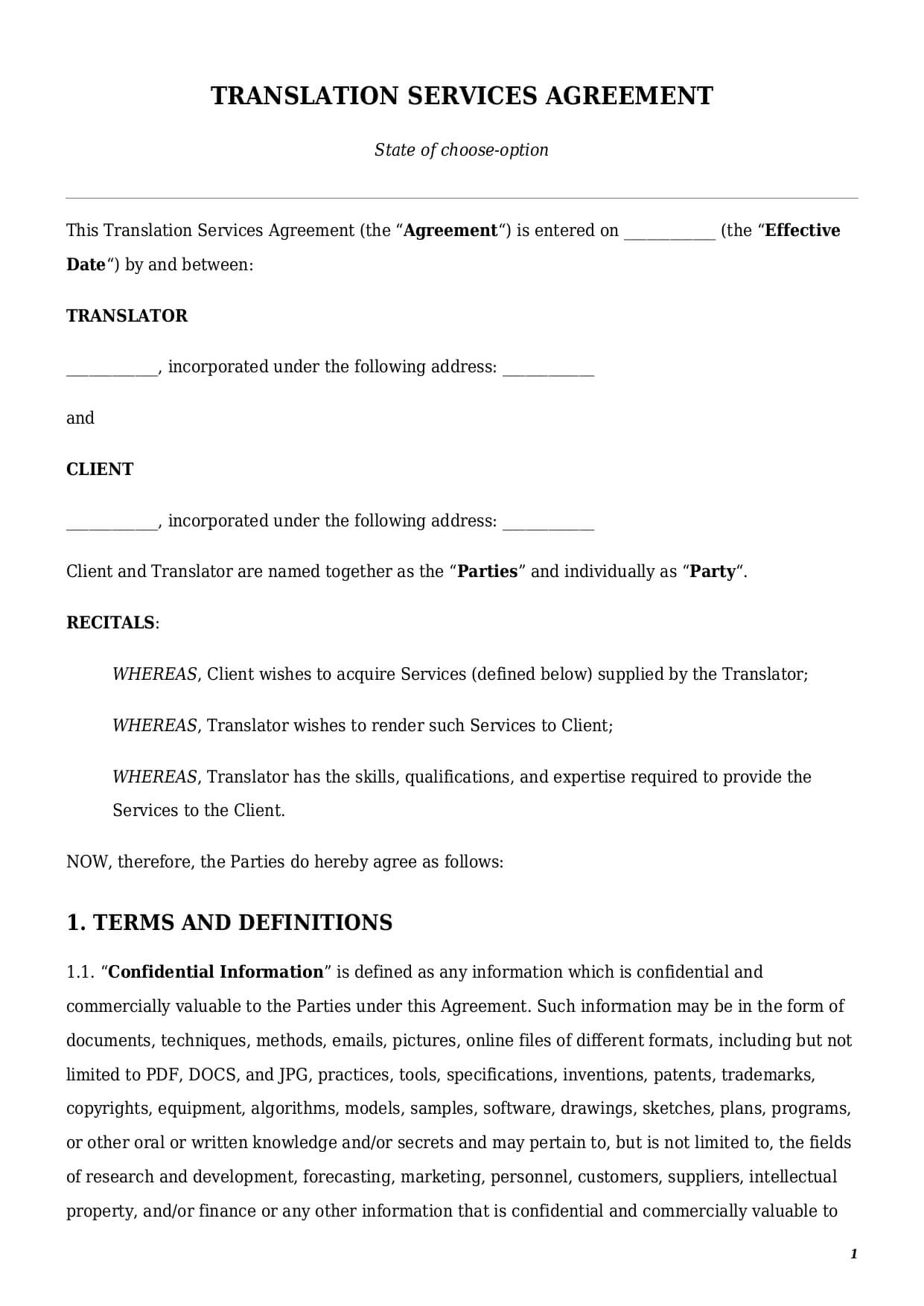Translation Services Agreement
Reviews


What is a translation contract?
A translation contract is a legally binding document between a translator and a client that defines the terms under which translation work will be provided. The present contract is also known as a translation services agreement, as a translator provides professional services to the client in exchange for remuneration.
This contract outlines both parties’ rights and expectations, as well as the following terms of cooperation:
- scope of work to be done (e.g., type of translation, style, number of words);
- usage of subcontractors or machine translation;
- payment terms
- duration and termination clause
- protection of confidential information and trade secrets.
The parties involved in a translation services contract are a translator and a client. The translator is an independent contractor, freelancer, or translation agency that has the necessary skills and expertise to deliver the requested services. The client is a business, organization, or individual that needs specialized services such as legal, medical, or technical translations.
How to draft a translation service contract template?
A well-prepared translation service contract template should address all relevant aspects of the working relationship to prevent misunderstandings. The following elements are essential:
Scope of Translation Services
Every translation services agreement should define the exact scope of services to be provided:
- type of information that should be translated (e.g., website, TV program, documents);
- languages that should be used for translation (e.g., from Spanish to English);
- regional language specification that should be used (e.g., Canadian French, American English).
It is also common for the parties to include a machine translation clause in the document’s template. The said clause defines if a translator is allowed to use machine translation (e.g., Google Translator) while providing their services. Even if a machine translation is allowed, a contract should include a disclaimer for an obligatory review by a human translator.
Services not directly listed in the text of a contract should incur separate charges. Additional services may include notarization or certification of translated documents.
Final deliverables
Every translation service contract sample should outline the format in which a final translation should be delivered. Such a format may include PDF, Word, PowerPoint presentation, etc. The parties should also define how the final translation should be delivered to the party—e.g., via email, cloud storage platform, etc.
A rule of thumb for every translation services agreement is to include a revision clause as well. In other words, the contract shall specify the process for reviewing completed translation. Usually, the text of a document shall include a specific period of time within which a client can request revisions or corrections.
Usage of Subcontractors
A translator may need to use subcontractors for the provision of all or part of the services defined in the initial translation contract. For instance, a translator agency has an existing agreement in Spanish translation, but they do not have enough personnel to complete the task on time. Thus, they can engage subcontractors for the provision of such services. The client and the translator should agree if the usage of subcontractors is allowed or not.
If subcontractors are allowed, in that case the translator is fully responsible for their actions, including the quality of the delivered work.
Payment Structure
One of the key questions while drafting a translation contract is “How to charge for translation services?” Well, there is no right answer to this question, as the parties may charge anyway they prefer. Considering the specific nature of a translation services contract, a usual payment structure includes the following:
- fixed fee;
- fee per one hour of work;
- fee per one translated word;
- fee per one translated page; or
- combination of several options above.
The parties may also include late payment fees when the client fails to pay for provided services on time. The payment method should also be defined in the text of a contract. Parties are free to choose any payment method they wish, including cash, bank transfer, etc.
Confidentiality
A confidentiality clause in a translation services agreement sample plays a key role. In most of the cases, a translator may get access to the documentation that includes a client’s sensitive information or trade secrets. To avoid disclosure of such information to third parties, the parties include a confidentiality clause directly in the contract.
A basic confidentiality clause limits a translator’s right to disclose or share in full or in part any information obtained from the client during the period of their cooperation. Such a limitation usually survives the end of the contract and could last for one, two, or more years after the end of the relationship.
Duration and Termination
A well-drafted translation services agreement sample shall define its duration. If the translation is needed on an ongoing basis, the parties have to include a start date for the provision of services. If, however, the translation is needed for a single project, the final date or deadline should be added in the text of a contract.
According to the general rule, either party should have the right to end the contract at any time. To do so, a termination notice should be sent well in advance to the other party. The notice period could be from 5 to 30 days, depending on the initial duration of a contract.
Besides that, a translation services contract sample may also provide for immediate termination of a contract in limited circumstances. For example, a translator may have the right to end the contract immediately if the agreed amount of payment has not been deposited on time.
How to customize a contract’s template at Faster Draft?
In order to personalize your translation services agreement template, follow a few easy steps below:
- Click the button “Create Document.”
- Answer simple questions in the questionnaire.
- Select a document’s type—translation service agreement PDF or Word.
- Make a payment.
- Download your customized document in seconds.
Table of content
Frequently Asked Questions (FAQ)
-
1. Which things to avoid when drafting a translation service contract sample?
There are a number of rules parties have to keep in mind when creating their translation contract.
First, avoid inclusion of vague terms and provisions in a document’s template. For instance, instead of saying “the payment should be made in a timely manner,” state the exact date or period of time after services are provided when the payment should be made.
Second, define the scope of provided services as clearly as possible. For example, instead of writing “translation and other related services,” specify exactly which other related services the client is expected to get. Failure to do so may result in a “scope creep” and potential future conflicts.
Third, timing is of the essence for some translation contracts; therefore, the schedule of translation services should also be included in the contract. If a project is complex, it is always better to include a list of milestones rather than one deadline for all services. Having clear milestones allows both parties to keep track of the work progress.
-
2. What is the difference between a translation services agreement and a general services agreement?
A translation services agreement is a type of services contract that is specifically tailored to the provision of qualified translation services. At the same time, a general services contract could be used for the provision of legal, accounting, and other types of services.

Looking for something Different?
Start typing to find out our collection of legal documents and contract templates
